Big plate with canal, beer (?) barrels and houses
Vraag
Does anyone know more about this plate? Is it in Delft and is it Pieter Adraensz. Kocks?
Afmetingen
40 cm
Collectie
publiekscollectie
Merk
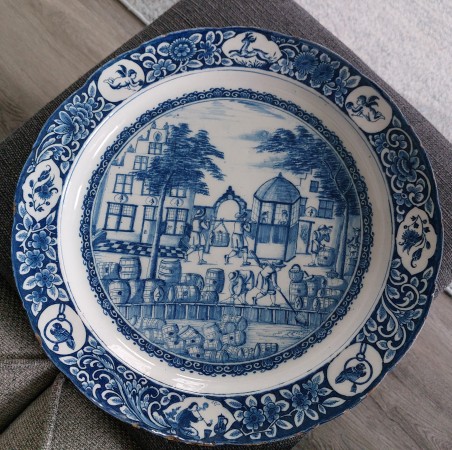
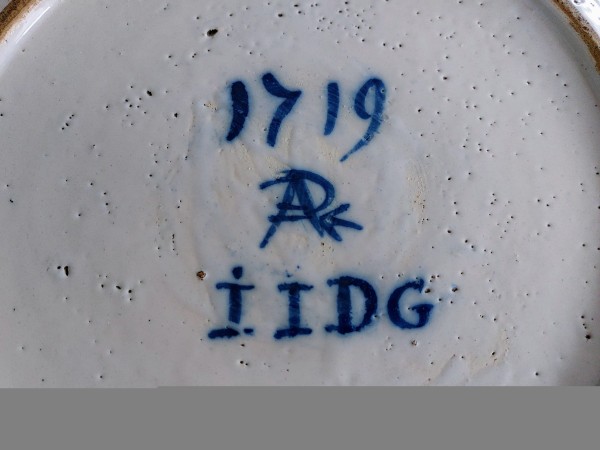
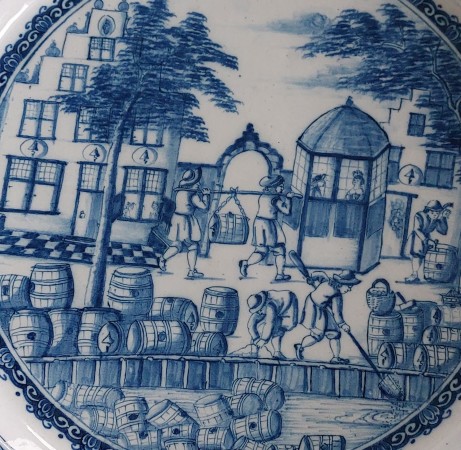
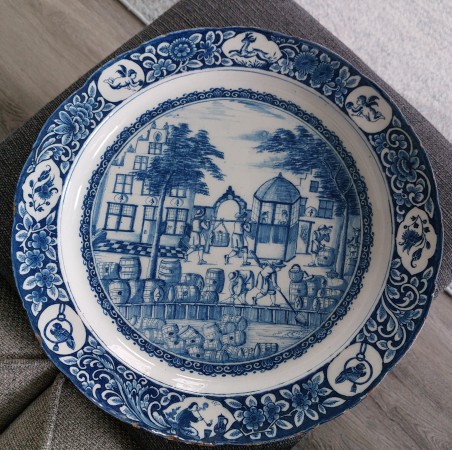









Reacties 22
Beautiful and rare plate. Indeed Pieter A. Kocx owner of the "Grieksche A " factory.
Kind regards,
The initials "IJDG" probably refer to Justus de Gelder, a pottery painter who worked at the pottery "De Griekse A" in Delft during the late 17th and early 18th centuries. His working period is estimated to have been between about 1690 and 1720. (which is correct with the date on your piece) The Greek A was a prominent Delft pottery, founded in 1658, and was known for producing high-quality Delftware. The initials "IJDG" on a piece of pottery therefore indicate the involvement of Justus de Gelder in painting or decorating it.
Kind Regards Franky
Uploads like yours don't happen very often but it's really nice when they do! Many thanks for sharing.
Thank you! We have allways been wondering if it was really that old. Does anyone happen to know what the image is? Is it in the city of Delft and are this 'bierbrouwers' beer brewers?
Pottery "De Grieksche A" in Delft was a brewery before the 17th century. This was not unusual, because many potteries in Delft had their origins in old breweries.
After the fall of Antwerp in 1585, many Flemish potters moved to Delft. As beer production declined at the time, vacant breweries were often converted into potteries due to their spacious workspaces and ovens already in place. Around 1658, "De Grieksche A" became one of the well-known Delft potteries, famous for its Delft pottery.
Unfortunately, there are no images available of the original pottery or the former brewery "De Grieksche A" in Delft. The pottery was located at Lange Geer 44-46 and extended to Achterom 64.
Although there are no visual documents of the building itself, it is known that the factory was located on the site of a former brewery in the center of Delft, on the east side of the Geer (today's Lange Geer) near the Rotterdamsche Poort.
presumably this is an image of the brewery before the commissioning by the Greek A and the beer barrels that are transported floating through the Lange Geer. Very nice piece and rare to see this in such condition.
Kind regards Franky
In reply to Pottery "De Grieksche A" in… by FrankyStevelinck1054
In reply to Pottery "De Grieksche A" in… by FrankyStevelinck1054
In reply to Pottery "De Grieksche A" in… by FrankyStevelinck1054
In reply to Pottery "De Grieksche A" in… by FrankyStevelinck1054
In reply to Pottery "De Grieksche A" in… by FrankyStevelinck1054
In reply to Pottery "De Grieksche A" in… by FrankyStevelinck1054
In reply to Pottery "De Grieksche A" in… by FrankyStevelinck1054
In reply to Pottery "De Grieksche A" in… by FrankyStevelinck1054
In reply to Pottery "De Grieksche A" in… by FrankyStevelinck1054
Thank you! I allways thought it to be beerbarrels and a canal in Delft. It will be nice to think that it actually is situated in the city of Delft. I understand that it can not be sure for a 100% but I will take this. With all these comments it is becoming even more pretty!
Woh...Great and important Delft charger, date: 1719, 100% authentic MUSEUM piece! Keep it safe and in good condition.Regards, Edwin van Drecht.
Very nice plate indeed! Pleas note that all the buildings and all the barrels have a mark or image on them. It must be that this plate was commissioned to the owner of the beer factory. If someone can recognise the image, please say so.
In a recent article, Robert Aronson mentions (not in the same words though), that items with a year on it are usually in special order or commission. The extra letters are often for the person or persons involved. So ii dg can be for one or two persons, like a married couple.
I am aware of the fact that I make a lot of assumptions, but maybe if you approach it like this, the name of the factory and owners can be found??
In reply to Very nice plate indeed!… by Jeroen Hartgers350
Thank you. Than it also could be a brewer from another city...
The brewery where later pottery De Griekse A was located, was originally owned by the De Vrije family. The brewery was originally called 't Vergulde Axe. ( logo on the barrels)
Unfortunately, there is limited information available about the De Vrije family, the original owners of the brewery that later became pottery De Griekse A in Delft.
On the beer barrels you can see the same logo that is also above the windows. This logo can be assigned to the family de free, so it would be plausible that this sign was made as a gift for the family
Verdict:
Analysis:
Merk:
As you may have gathered from the enthusiasm of our top users, this is a historically significant dish, with few equals. Not only is it marked for Pieter Kocx—or more precisely, his widow, Johanna van der Heul, who owned the De Grieksche A (The Greek A) factory from 1703 to 1722—but it also features a lively scene on the front. To top it all off, it is actually dated, and within Johanna’s period of ownership. The piece is of a beautiful size, and I particularly admire the stepped gable, the arch, and the gazebo. Thank you for sharing it on this platform—enjoy it!
Maybe interesting to see this Delft charger, 1720, 35cm of a Beer? barrel factory. Not marked. Regards, E.
The brown color on the rim I have only seen used by De Grieksche A on items by Jacob Van Der Kool and Jan Theunis Dextra. I have not seen it on Pieter Kocx items, but it would make sense because this barrel charger is so late. The rims of other factories such as De Paeuw, Porcelijene Byl , De Metaale Pot are lighter brown, orange or yellow. Of course, there could be exceptions!
Add new comment
Only logged in users can post comments
Log in or register to post comments